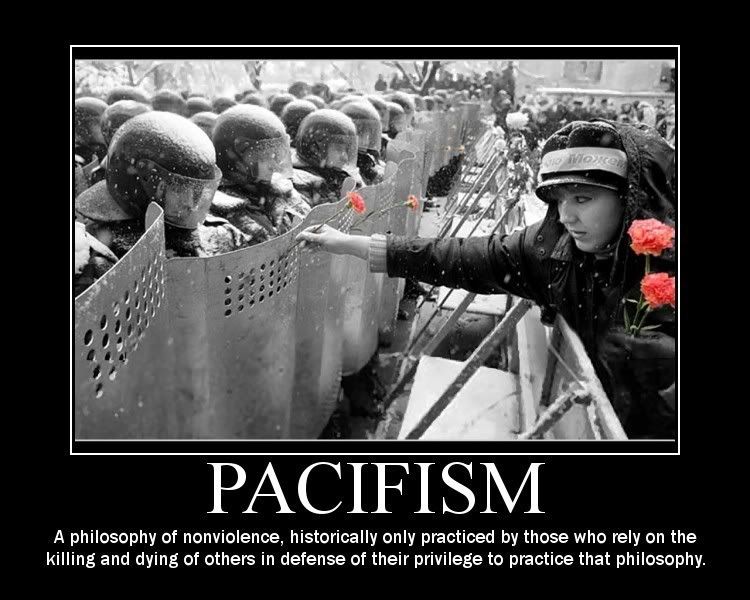The New Testament is not about war and taking human life. Our discussions can never misconstrue it otherwise. Christ came with a message of peace and life. To suppose he was a complete pacifist though would be a stretch. To suppose Christians are to be pacifists also is equally a stretch. Christ knew that his mission in life involved his very own death (John 2:19). To speak of God as love is true. To say that God is only love however is false. There are alot of true things that can be said by pacifists and non-pacifists however they must not be understood in a vacuum.
Pacifism is a dream. It is ideal and may prescribe the way things ought to be. However, we do not live in a dream world or one of make believe. During WWII a Protestant scholar and martyr Dietrich Bonhoeffer resisted the onslaught of the Third Reich. He was a brilliant and peaceful man who opposed National Socialism. His opposition however soon grew to the place where Bonhoeffer was part of a conspiracy to kill another human being—Adolf Hitler. In his book Ethics Bonhoeffer noted the tension of guilt and freedom,
“the structure of responsible action includes both readiness to accept guilt and freedom.” (Ethics, pg. 210)
This is more true in the case of Peter Waldo. During the 12th Century the Waldenses were a pre-Reformation group, led by Waldo, that stressed a return to the Bible. They also rejected war and the taking of human life as did Bonhoeffer. After the Fourth Lateran Council (1215) the Inquisition was revived to stamp out heresy. Waldo and his group were condemned as heretics and eventually forced to defend themselves. Pacifism might be the right thing to do but it is quite apparent that it is not the only thing to do. The Scriptures never state that all killing his prohibited and yet this presupposition is completely assumed by pacifists.
In Philippians 1 Paul tells us "that what has happened to me has really served to advance the gospel, so that it has become known throughout the whole imperial guard..." (1:12-13, ESV) Three chapters later in 4:22 Paul sends greetings to the saints in the household of Caesar. The imprisonment of Paul had resulted in the salvation of some within the palace guard in Caesar’s household. No doubt many early Christians served in some military capacity.
The New Testament nor the church has a political agenda. The ministry of the church is spiritual and is to support the protection of human rights, human dignity and the human family. In order to preserve rights, dignity and family one may have to act with force in order to maintain them. It is complete negligence to assume otherwise. As Bonhoeffer noted, we must accept freedom but it can also come with the responsibility of guilt.
In Romans 13 "every person" is to be subject to governing authorities. Such authorities have been given by God. (13:1) Paul also says, "rulers are not a terror to good conduct, but to bad." (13:3, ESV) He goes on to conclude "if you do wrong, be afraid, for he does not bear the sword in vain." (13:4, ESV) The term "sword" is a direct reference to lethal force. This "sword" does not only symbolize authority. In fact the word for sword here is macharia. In the Septuagint, this same word is used for a lethal weapon (Gen 34:26; Judges 3:16).
The Sermon on the Mount emphasizes that we are the "salt" of the earth and if it loses its savor it becomes worthless (Matthew 5:13). In 1 Peter it is recorded, "Be subject for the Lord's sake to every human institution, whether it be to the emperor as supreme, or to governors as sent by him to punish those who do evil and to praise those who do good." (1 Peter 2:13-14, ESV)
In my opinion, the New Testament does not advocate a Christian theocracy. It is written more to believers and not a nation which we see in the Old Testament (e.g. Israel). As a result there is less emphasis on warfare in the New Testament. As we have already noticed that does not also mean there is nothing said about war. Notice John the Baptist in Luke 3:
John had been preaching his message. Preparing the way "of the Lord" (3:5). He then admonishes the crowd to "bear fruits in keeping with repentance." (3:8). Then groups from within the crowd begin to ask John question. A tax collector is instructed to "collect no more than you are authorized to do." This would probably offend many tax collectors of that day who pillaged the local population. Then "Soldiers" asked him "what shall we do?" John reveals the further corruption being used by money and tells them to not extort money and to be content with their wages. He never tells them to leave the Roman army or to be a conscientious objector.
Four chapters later Luke records Jesus praising a Roman centurion for having "such faith" that he had not found "even in Israel..." (Luke 7:9). In Acts 10 Luke also records Apostle Peter and Cornelius, another solider. Cornelius responds positively to the message of Peter and is saved. Peter never informs Cornelius that he must abandon his career in the Roman army.


1 comment:
Just awesome! I also love your blog's design! I just started one myself for our church's website. I'm kind of new to blogging though so I'm checking out other Christian blogs to get some inspiration for design and content. Feel free to check our new blog at our church in Bellevue
Would love to know what you think!
Post a Comment